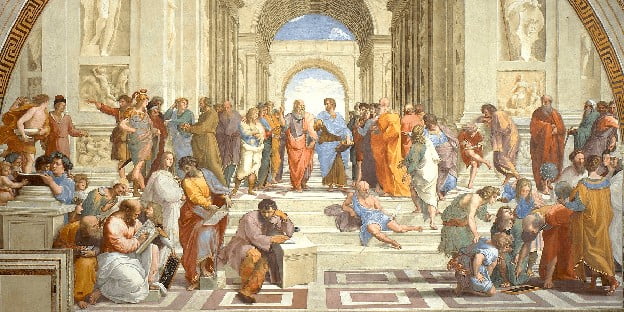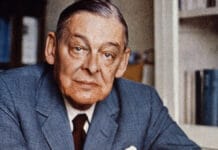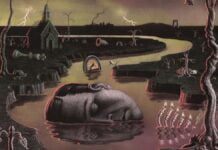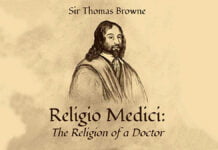Aristotle (384-322 BC) was a Greek philosopher and scientist regarded as one of the most prominent figures in Western philosophy. Aristotle was a student of Plato, the preeminent Greek philosopher of the time. He spent nearly two decades as a student at Plato’s Academy, where he studied philosophy and science. Aristotle developed his theories in response to those of his mentor while still holding true to some of Plato’s key ideas. As such, Aristotle is often referred to as the “student” or the “disciple” of Plato. Aristotle’s works on philosophy, physics, ethics, biology, logic, and poetics have had an enduring impact on many fields of study.
Aristotle’s Poetics is one of the most influential works in the history of Western literary criticism. Written in the 4th century BCE, it is the earliest surviving work of dramatic theory and remains a foundational text in the study of literature, particularly in the analysis of tragedy. Poetics is a concise treatise, composed initially as a series of lecture notes. Despite its brevity, the work covers a wide range of topics related to poetry and drama, with a particular focus on tragedy. Aristotle’s aim in Poetics is to systematically account for the principles underlying successful literary compositions. He begins by defining poetry and distinguishing its various forms, such as epic, tragedy, comedy, and dithyrambic poetry. However, the bulk of Poetics is devoted to analysing tragedy, which Aristotle considers the highest form of poetic art. His insights into the nature of tragedy, the elements of a well-constructed plot, and the function of literary devices like catharsis and mimesis have shaped literary theory for centuries.
Aristotle proposes studying poetry by analysing its constitutive parts and then drawing conclusions. The portion of the Poetics that survives discusses mainly tragedy and epic poetry. Aristotle also wrote a treatise on comedy that has been lost. He defines poetry as the mimetic, or imitative, use of language, rhythm, and harmony, separately or in combination. Poetry is mimetic in that it creates a representation of objects and events in the world, unlike philosophy, for example, which presents ideas. Humans are naturally drawn to imitation, and so poetry has a strong pull on us. It can also be an excellent learning device since we can coolly observe imitations of things like dead bodies and disgusting animals when the real thing disturbs us.
Aristotle identifies tragedy as the most refined version of poetry dealing with lofty matters and comedy as the most refined version of poetry dealing with base matters. He traces a brief and speculative history of tragedy as it evolved from dithyrambic hymns in praise of the god Dionysus. Dithyrambs were sung by a large choir, sometimes featuring a narrator. Aeschylus invented tragedy by bringing a second actor into dialogue with the narrator. Sophocles innovated further by introducing a third actor, and gradually, tragedy shifted to its contemporary dramatic form.
Aristotle defines tragedy according to seven characteristics:
- it is mimetic
- it is serious
- it tells a whole story of an appropriate length
- it contains rhythm and harmony
- rhythm and harmony occur in different combinations in different parts of the tragedy
- it is performed rather than narrated
- it arouses feelings of pity and fear and then purges these feelings through catharsis
A tragedy consists of six important parts listed here from most to least:
- plot
- character
- thought
- diction
- melody
- spectacle
A well-formed plot must have a beginning, which is not a necessary consequence of any previous action; a middle, which follows logically from the beginning; and an end, which follows logically from the middle and from which no further action necessarily follows. The plot should be unified; every element should tie into the rest, leaving no loose ends. This unity allows tragedy to express universal themes powerfully, making it superior to history, which can only talk about particular events. Episodic plots are bad because there is no necessity for the sequence of events. The best kind of plot contains surprises, but surprises that, in retrospect, fit logically into the sequence of events. The best types of surprises are brought about by peripeteia, or reversal of fortune, and anagnorisis, or discovery. A good plot progresses like a knot tied up with increasingly greater complexity until the moment of peripeteia, at which point the knot is gradually untied until it reaches an entirely unknotted conclusion.
For a tragedy to arouse pity and fear, we must observe a hero who is relatively noble going from happiness to misery as a result of an error on the part of the hero. Our pity and fear are aroused most when family members harm one another rather than enemies or strangers. In the best plot, one character narrowly avoids killing a family member unwittingly, thanks to an anagnorisis that reveals the family connection. The hero must have good qualities appropriate to their station and should be portrayed realistically and consistently. Since both the character of the hero and the plot must have logical consistency, Aristotle concludes that the untying of the plot must follow as a necessary consequence of the plot and not from stage artifice, like a deus ex machina (a machine used in some plays, in which an actor playing one of the gods was lowered onto the stage at the end).
Aristotle discusses thought and diction and then moves on to address epic poetry. Whereas tragedy consists of actions presented in a dramatic form, epic poetry consists of narrative verses. Tragedy and epic poetry have many common qualities, notably the unity of plot and similar subject matter. However, epic poetry can be longer than tragedy; it can deal with more fantastic action with a much broader scope because it is not performed. By contrast, tragedy can be more focused and takes advantage of the devices of music and spectacle. Epic poetry and tragedy are also written in different meters. After defending poetry against charges that it deals with improbable or impossible events, Aristotle concludes by weighing tragedy against epic poetry and determining that tragedy is, on the whole, superior.

The Concept of Imitation
One of the central concepts in Poetics is mimesis, which Aristotle defines as the imitation of action. For Aristotle, all forms of poetry and drama are imitative in nature; they seek to represent life and human action in various ways. Unlike Plato, who viewed imitation as a mere copy of reality and, therefore, inferior, Aristotle sees mimesis as a fundamental human instinct and a means of learning. In tragedy, mimesis involves the imitation of serious and complete actions that evoke emotions such as pity and fear.
The Structure of Tragedy
Aristotle outlines the critical structural elements of tragedy, which he argues must have a beginning, middle, and end. A well-constructed plot, or mythos, is crucial to a successful tragedy. According to Aristotle, the plot should be unified, meaning that all actions within the play are causally related and contribute to the overall narrative. He distinguishes between simple and complex plots, favouring the latter for its inclusion of elements such as reversal (peripeteia) and recognition (anagnorisis), which heighten the emotional impact of the drama.
Tragic Hero and Hamartia
The notion of the tragic hero is central to Aristotle’s concept of tragedy. The tragic hero is typically a noble or illustrious character who, despite their greatness, possesses a flaw or makes an error in judgment (hamartia) that leads to their downfall. Aristotle emphasises that the hero’s downfall should not result from vice or depravity but rather from some mistake or weakness. This idea of the tragic flaw has been widely interpreted and debated, with some scholars viewing it as a moral failing and others as a misjudgment or ignorance.
The Purging of Emotions
One of the most discussed and debated concepts in Poetics is catharsis. Aristotle suggests that the purpose of tragedy is to arouse the emotions of pity and fear in the audience and to purify or purge these emotions through their experience of the drama. While Aristotle does not explicitly define catharsis in Poetics, it is commonly interpreted as a form of emotional release or purification. The exact nature of catharsis has been the subject of much scholarly debate, with interpretations ranging from psychological relief to moral education.
The Role of Plot in Tragedy
For Aristotle, the plot is the most essential element of tragedy. He argues that the plot must be coherent, with each event logically following the previous one. The plot should be constructed in such a way that it evokes the emotions of pity and fear, leading to catharsis. Aristotle emphasises that the best plots involve a reversal of fortune, where the hero’s situation changes dramatically, often from prosperity to disaster. This reversal should be accompanied by recognition, where the hero gains some insight or knowledge that was previously hidden.
Character and Thought
While plot is paramount in Aristotle’s analysis, he also acknowledges the importance of character and thought. The characters in a tragedy should be consistent, believable, and appropriate to their roles. Aristotle notes that the moral purpose of the characters should be clear, as their actions are central to the development of the plot. Thought, or dianoia, refers to the themes, arguments, and messages conveyed through the character’s speech and actions. Thought is closely related to the ethical and philosophical dimensions of the play, reflecting the playwright’s exploration of universal truths.
Language and Diction
Aristotle discusses the role of language and diction in tragedy, noting that the language should be appropriate to the subject matter and the characters. He identifies different levels of diction, from everyday speech to more elevated and poetic language. Aristotle also examines the use of metaphor, which he considers a mark of genius in poetry. A well-crafted metaphor can illuminate complex ideas and emotions, adding depth to the narrative.
The Chorus in Tragedy
The chorus plays a significant role in Greek tragedy, and Aristotle devotes a section of Poetics to its function. He argues that the chorus should be integrated into the action of the play rather than being a mere interlude or background element. The chorus often represents the collective voice of society, providing commentary on the events of the drama and reflecting the moral and emotional responses of the audience. Aristotle sees the chorus as an essential part of the tragic structure, contributing to the overall unity of the play.
The Concept of the Unities
Although Aristotle does not explicitly formulate the “Three Unities” (of time, place, and action) in Poetics, his ideas laid the groundwork for their later development. The unity of action, which Aristotle discusses, emphasises that a tragedy should focus on a single, coherent plot without subplots or digressions. The unities of time and place, which became prominent in later classical and neoclassical criticism, suggest that the action of a play should occur within a single day and in a single location. However, these ideas were more rigidly applied by later critics than by Aristotle himself.
Epic vs. Tragic Poetry
Aristotle contrasts tragedy with epic poetry, noting that both forms share similar elements, such as plot, character, and thought. However, he argues that tragedy is superior to epic poetry because it is more concentrated and has a more significant emotional impact. Tragedy, being performed rather than merely narrated, engages the audience more directly, leading to a more intense experience of catharsis. Additionally, Aristotle notes that tragedy can include elements such as music and spectacle, which enhance its emotional and aesthetic effects.
Sublimity and the Artistic Ideal
While Aristotle does not explicitly use the term “sublimity” in Poetics, his discussion of the artistic ideal touches on themes later associated with the sublime. Aristotle’s emphasis on the importance of evoking powerful emotions in the audience and his focus on the grandeur and seriousness of tragedy align with the later concept of the sublime in literature. The sublime, as developed by later critics like Longinus, refers to the ability of art to inspire awe and transcend ordinary experience. This idea resonates with Aristotle’s analysis of tragedy.
Impact on Literary Criticism
Aristotle’s Poetics has profoundly influenced the development of literary criticism, particularly in the Western tradition. His ideas about the structure of tragedy, the role of the tragic hero, and the function of catharsis have shaped how critics and scholars have analysed literature for centuries. Poetics provided a framework for understanding the elements of successful literary composition, influencing Renaissance theorists like Sir Philip Sidney, neoclassical critics like Nicolas Boileau, and modern scholars of drama and narrative theory.
Aristotle’s Poetics and Modern Literary Theory
In the 20th century, Aristotle’s Poetics remained a foundational text for various schools of literary theory. Structuralists and narratologists, for example, have drawn on Aristotle’s ideas about plot and narrative structure. Psychoanalytic critics have explored the psychological dimensions of catharsis and hamartia, while feminist critics have interrogated Aristotle’s concepts of character and gender roles in tragedy. Despite its ancient origins, Poetics remains relevant to contemporary debates about literature and its function in society.
Poetics’ insights into the nature of tragedy, narrative structure, and literature’s emotional impact have influenced countless writers, critics, and scholars. Although Poetics is in a very different category from the works of Aristotle on topics such as ethics, logic, and physics, it has exercised a great deal of influence on subsequent literary theory, particularly in the Renaissance. Unfortunately, later interpreters turned many of Aristotle’s suggestions into strict laws, restricting the flexibility of drama in ways that Aristotle would not have anticipated. While some of Aristotle’s ideas have been challenged or revised over time, Poetics provides a rich source of analysis and inspiration for those interested in storytelling. Its enduring legacy is a testament to Aristotle’s profound understanding of the complexities of human experience and the power of literature to illuminate them.






























